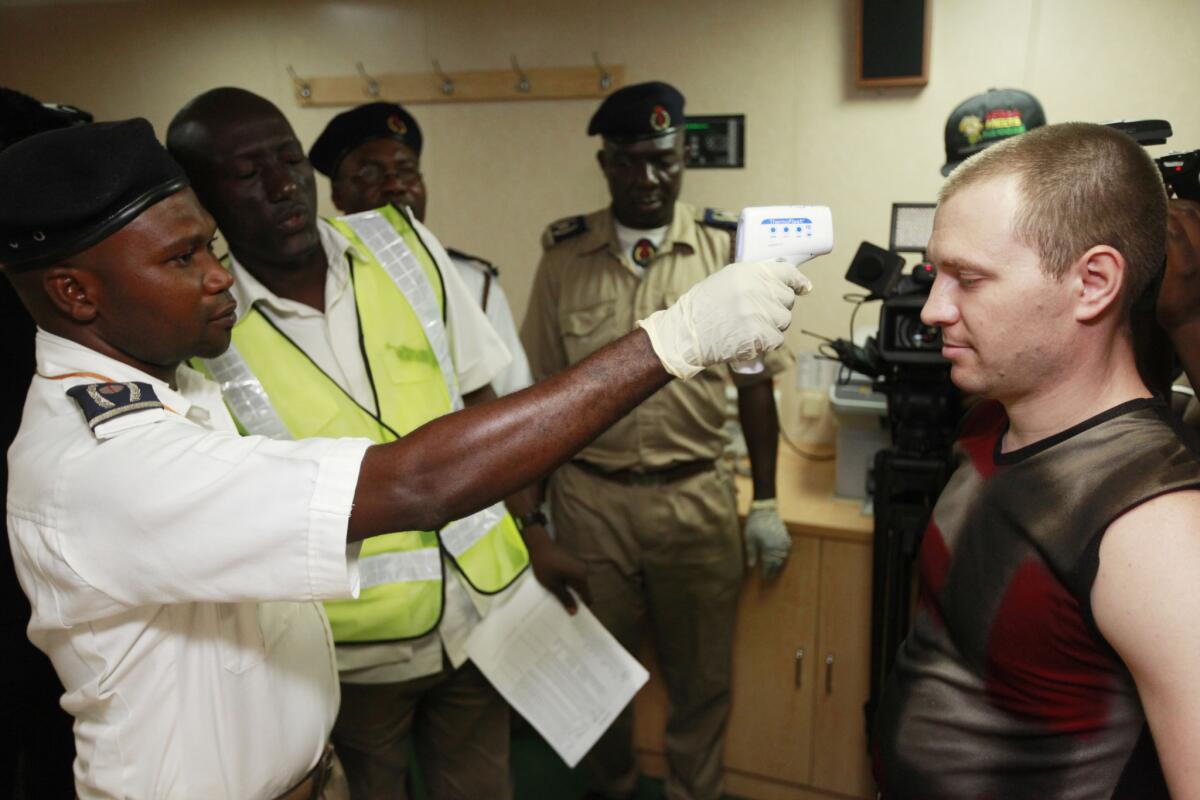Ebola outbreaks in Senegal and Nigeria now under control, CDC says

The Ebola outbreaks in Senegal and Nigeria appear to be under control, with no new cases reported in more than 21 days, according to reports issued Tuesday by the U.S. Centers for Disease Control and Prevention.
As international health officials scramble to stop the exponential spread of Ebola in in Guinea, Liberia and Sierra Leone, CDC researchers say quick work by officials and medical personnel in neighboring West African nations appears to have stopped the disease in its tracks.
The incubation period for the Ebola virus is 21 days. If a nation sees no new cases after that period of time, an outbreak is said to be under control, according to Dr. Barbara Knust, a CDC epidemiologist.
If no new cases occur in 42 days, the outbreak is said to be over.
“That’s how the World Health Organization determines that an outbreak is over and that there’s no more human-to-human transmission,” Knust said. “But even then it’s important for all countries to be vigilant, because there’s still ongoing transmission in the heavily affected countries.”
In both Nigeria and Senegal, outbreaks began with a single infected individual importing the virus from the so-called hot zone.
In Nigeria, an acutely ill 40-year-old Liberian American, Patrick Sawyer, collapsed in Lagos’ international airport after arriving there on a commercial flight on July 20.
Sawyer died five days later, and epidemiologists determined that he likely came into contact with 72 people at the airport and within the hospital. Some 150 people then fanned out to locate those people and people they had come into contact with as well.
The threat to Nigeria was enormous, study authors wrote in the CDC’s Morbidity and Mortality Weekly Report. “Lagos is Africa’s largest city and is also a transit hub for the region with air, land and sea ports of entry.”
Ultimately, health officials reported 19 cases of Ebola -- 18 of which were confirmed -- and eight deaths. No new cases have been reported since Aug. 31, authors wrote.
In Senegal, a 21-year-old Guinean man who likely became infected with Ebola while preparing his brother’s body for burial, arrived in Dakar in a taxicab jammed with seven people.
The man was admitted to a hospital on Aug. 26 -- about 12 days after his arrival -- and promptly isolated, researchers said. Medical officials determined that he had come into contact with 67 people, and set about contacting them and asked them to submit to a voluntary, 21-day, in-home quarantine.
No other confirmed cases of Ebola were ever reported, and the infected man eventually recovered and was released from the hospital on Sept. 19, officials said.
As of Monday, the total number of cases in all five West African nations that have reported Zaire species Ebola virus infections was 6,574, according to the CDC. The total number of deaths is 3,091.
An outbreak of Ebola in the Democratic Republic of the Congo, which has so far sickened 70 and killed 42, is said to be unrelated to the larger West African outbreak, according to the WHO.
While the virus in the DRC belongs to the same species as the larger outbreak, it is genetically different. Researchers say this smaller outbreak was the result of humans eating wild animals, or “bush meat,” that had been infected with the virus.
Initially, infection will cause flu-like symptoms such as fever, vomiting, muscle aches and weariness. As the virus continues to multiply patients will suffer bleeding and possible organ failure as the body goes into a state of shock.
The virus is passed through body fluids such as blood, vomit, saliva, urine or feces.
Follow @montemorin for science news







